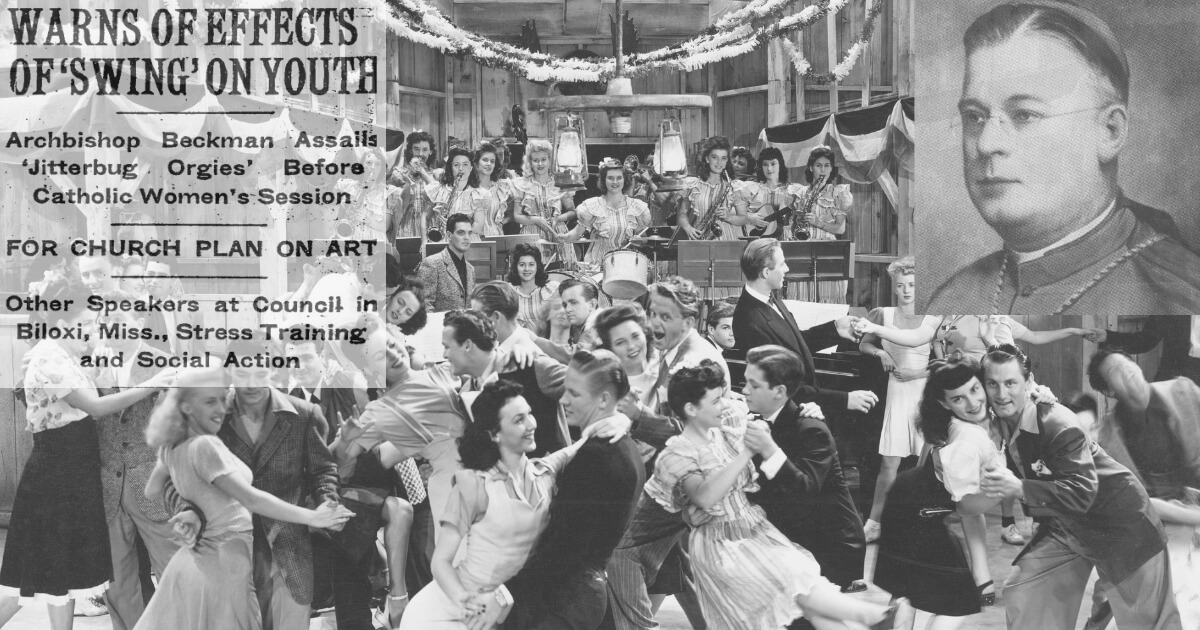
Images: Shutterstock, The New York Times
In the late 1930s, there was a scourge negatively affecting the youth of Dubuque: Swing music.
This was according to the Most Rev. Francis Beckman, who served as archbishop of the Archdiocese of Dubuque from 1930-46.
Beckman’s stance against swing music made national headlines—which we will get to in a second—but here’s a little background on swing music courtesy of the Carnegie Hall website:
“Swing is a style of jazz that grew from African American roots and dominated American popular music in what came to be known as the Swing Era (from approximately 1930 to 1945). Played by big bands led by such luminaries as Duke Ellington, Count Basie, Benny Goodman, and Artie Shaw, swing has a distinctive rhythmic feel.”
[inline-ad id=”1″]
Swing music also led to swing dancing and some of the more notable swing dances are the Lindy Hop, the Charleston, and the Collegiate Shag. Harlem is credited with being the birthplace of swing dancing and its invention coincides with the Harlem Renaissance.

New York, NY: Harlem: Inspired crowd in Savoy ballroom during jitterbuggin days. Undated photograph. Getty Images
If you’ve ever seen a swing dancing scene in a movie, think about how awesome it would have been to experience that in person. Well, it seems like it would be awesome to me but, clearly, the archbishop disagrees with that sentiment.
 During the 1938 National Council on Catholic Women, Beckman unleashed a tirade against swing and all that it stood for. The New York Times was there to jot it all down:
During the 1938 National Council on Catholic Women, Beckman unleashed a tirade against swing and all that it stood for. The New York Times was there to jot it all down:
“Today, while the Church pursues as zealously as ever she has in the past her policy of motivating, conserving and drawing to herself the best of modern art, evil forces are hard at work endeavoring to undermine its Christian status, debauch its high purpose and harness it to serve individual diabolical ends.”
The quote continues.
“We permit, if not freely endorse by our criminal indifference, ‘jam sessions,’ ‘jitter-bugs’ and cannibalistic rhythmic orgies to occupy a place in our social scheme of things, wooning our youth along the primrose path to hell!”
[inline-ad id=”2″]
My dude, it was just dancing. Chill! Could you imagine if the archbishop saw a person twerk? His head would explode.
Also, by the way, that quote still isn’t done. We’ve already had hell and orgies mentioned, but I bet you can’t guess where it goes next.
“In such a setting art has been robbed, as was the Man of Jericho, of its beautiful essence and meaning and left to die along the high-road of communistic endeavor.”
That’s right, the Rev. Beckman brought up communism! Because jazz music and communism were apparently bedfellows in his eyes. Have to say, I’m a little disappointed he didn’t bring up the evils of cannabis so that we could also get a taste of reefer madness.
So why did Beckman hate swing music?
[inline-ad id=”3″]
I have nothing tangible—I do have a working theory that I won’t elaborate on but if you consider the origins of swing and the troubling history of Dubuque you might be able to gain a sense of what I’m thinking—but one reason could be because local college students seemed to be enamored by it at the time.
In 1937, a year before Beckman’s speech went pre-internet viral, an article published in The Witness—the former official newspaper of the Archdiocesan—noted that swing music was popular with students.
In fact, it was the second-most popular music genre to hear played on the loudspeakers at what is now Loras College in Dubuque. I like to picture Beckman visiting campus, hearing that swing music and just being incensed!
[inline-ad id=”4″]
Swing music eventually faded out of popularity on its own, although it had a short-lived revival in the ’90s. Part of me likes to think that swing music was dying down in the late 1930s, but the uproar caused by Beckman’s speech gave it a few more years of life out of spite.
Another twist to this story is that Beckman fell out of favor with the higher-ups in the Catholic Church after he fell for a gold-mining scam. Maybe gold mining was the crypto of the 1930s?
According to Encyclopedia Dubuque, Beckman’s mining failure cost the archdiocese $600,000 by the end of 1942, which comes out to nearly $7 million dollars in today’s money. In 1944, another bishop was named coadjutor archbishop alongside Beckman who was stripped of administrative duties.
Beckman formally resigned his post in Dubuque in 1946 and died in 1948. On the plus side for Beckman, swing music’s popularity drastically faded after World War II, so he outlived the fad he hated by a couple of years, which was probably as good as gold for him.
by Ty Rushing
06/29/22
To contact Senior Editor Ty Rushing for tips or story ideas, email him at [email protected] or find him on Twitter @Rushthewriter
Iowa Starting Line is part of an independent news network and focuses on how state and national decisions impact Iowans’ daily lives. We rely on your financial support to keep our stories free for all to read. You can contribute to us here. Also follow us on Facebook and Twitter.
[inline-ad id=”0″]
Politics

Biden cancels student loan debt for 2,690 more Iowans
The Biden administration on Friday announced its cancellation of an additional $7.4 billion in student debt for 277,000 borrowers, including 2,690...

The Republican war on Medicare raises the stakes in 2024
Nearly 670,000 Iowans rely on Medicare benefits—benefits they spent decades paying into, with the promise that the program would be there for them...
Local News

No more Kum & Go? New owner Maverik of Utah retiring famous brand
Will Kum & Go have come and gone by next year? One new report claims that's the plan by the store's new owners. The Iowa-based convenience store...

Here’s a recap of the biggest headlines Iowa celebs made In 2023
For these famous Iowans, 2023 was a year of controversy, career highlights, and full-circle moments. Here’s how 2023 went for the following Iowans:...







